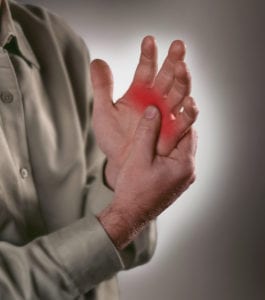The efficient use of one’s hands is critical to the independence of a senior living at home. Carpal tunnel syndrome is a common condition that can significantly affect a senior’s ability to accomplish simple daily tasks that so often are taken for granted. When a senior’s ability to accomplish simple daily tasks diminishes, this places a greater demand on you, the caregiver, and creates a greater need for home care assessment and services.
Provided here is information about the symptoms, causes, and treatments of carpal tunnel syndrome. If you think your senior has developed, or is at risk for developing, carpal tunnel syndrome, consider having a home care provider assess your senior’s condition and evaluate your need for home care services so that your senior with carpal tunnel syndrome may maintain as much independence as possible while managing this condition.
Symptoms of Carpal Tunnel Syndrome
The bones in the wrist have a small passageway running through them called the “carpal tunnel.” The primary nerve that sends sensory information to the fingers, called the “median nerve,” runs through the carpal tunnel. If the tendons and ligaments in the carpal tunnel become inflamed, they can put pressure on the median nerve. This pressure can cause:

• Pain in the palm, wrist, or forearm
• Numbness
• Burning sensation
• Tingling
• Weakness in the fingers, hand, and wrist
• Difficulty gripping or carrying objects
• Loss of feeling in the hand and fingers
These common symptoms can begin slowly but may gradually become worse over time. If these symptoms occur, your senior may be suffering with “carpal tunnel syndrome.”
The symptoms of carpal tunnel syndrome usually occur on the side of the hand where the thumb is located. This is because the median nerve does not run to the pinky finger or half of the ring finger. If your senior is experiencing these symptoms in the pinky finger or the entire ring finger, then your senior may be experiencing arthritis instead of, or in addition to, carpal tunnel syndrome.
You should have a physician conduct a full evaluation to determine whether your senior is experiencing carpal tunnel syndrome and how to treat it. You will then be better able to access your need for home care services to assist in managing this condition.
Causes of Carpal Tunnel Syndrome
Carpal tunnel syndrome may develop as a result of any combination of things, and so it is very difficult to pinpoint a specific cause of the condition. However, there are some common activities that typically contribute to the development of carpal tunnel syndrome, such as:
• Activities involving repetitive hand or finger movement
• Extensive writing
• Over-use of a computer keyboard or computer mouse
• Acute injury (such as a fractured wrist)
• Genetic conditions (being born with a particularly narrow carpal tunnel)
• Presence of tumors of other conditions (obesity, diabetes, or rheumatoid arthritis)
Treatment for Carpal Tunnel Syndrome
If your senior is diagnosed with carpal tunnel syndrome, he or she should try to do the following:
• Keep the wrist straight or immobile
• Avoid repetitive hand movements
• Minimize writing and computer use
• Avoid activities that apply stress to the hand and wrist or that require a strong grip
A physician may implement a conservative regimen of anti-inflammatories, analgesics, or corticosteroids to treat pain and inflammation. Ice compacts are also effective for pain and inflammation. Wearing a splint at bedtime may help to immobilize the wrist while sleeping.
As a caregiver to a senior who suffers with carpal tunnel syndrome, you will now have to assist with the daily tasks that may become too painful or difficult for your senior to perform. These may include:
• Dressing
• Cooking
• Opening jars
• Grooming
• Brushing teeth
• Writing
• Using the computer
• Driving
Physiotherapy may be helpful for strengthening the muscles in the hand. This may alleviate some of the pain associated with carpal tunnel syndrome and increase your senior’s ability to perform daily tasks. However, if symptoms persist, surgery may be necessary.
Research on the effect of surgery on the elderly is debated. Some studies show that surgery for the elderly is highly successful, but other studies reveal that seniors tend to be less satisfied with surgery than younger patients, possibly because resulting nerve damage tends to be more advanced with age. Seniors usually recover from surgery after several weeks but will require additional home care assistance, especially during the recovery period.
Early intervention is important for your senior to minimize the negative effects of carpal tunnel syndrome and to maintain optimum daily functioning and independence. You should inquire with your home care provider to learn more about effective ways to manage a senior with carpal tunnel syndrome.
If you or an aging loved one needs Senior Care in Roseville, CA, remember Senior Home Care Services. Call us at (916) 514-7006 for more information.
Sources:
https://www.retireathome.com/treat-carpal-tunnel-syndrome-seniors/
https://www.aafp.org/afp/2016/1215/p993.html
https://www.webmd.com/pain-management/carpal-tunnel/news/20001027/too-old-for-carpal-tunnel-surgery-no-such-thing#1
https://www.ncbi.nlm.nih.gov/pmc/articles/PMC4439585/
file:///C:/Users/mxflannery/Downloads/treating-carpal-tunnel-syndrome-in-the-elderly-too-little-too-late-2376-0281-1000280.pdf
- Understanding How Medication Affects Seniors’ Oral Health - April 23, 2024
- How Can 24-hour Home Care Help Intergenerational Families? - April 17, 2024
- Embracing Home Care for a Spouse with Parkinson’s Requires Proper Future Planning - April 10, 2024


